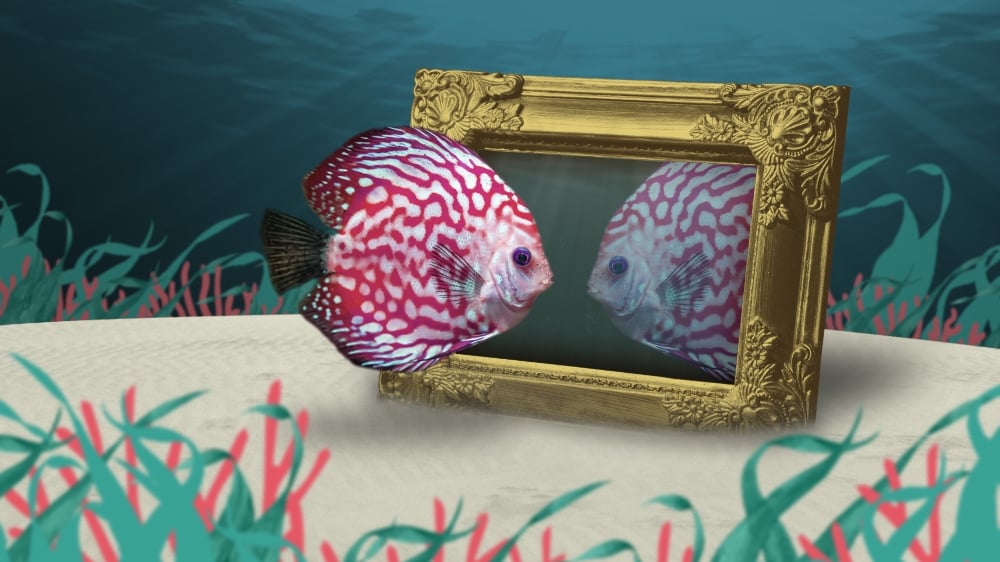This is a sponsored post * [what is this?]
A few years ago, scientists from the University of Tennessee noticed curious behaviour in three captive male white-spotted cichlid fish. Each fish, swimming alone in an aquarium, interacted with a 12cm semi-buoyant thermometer. They would nudge and bump the object with their noses in a manner distinctive to each fish. Collisions between thermometer and aquarium glass were loud enough to be heard in the adjoining room. During 12 observation sessions, there were over 1,400 interactions between fish and thermometer.
Were the fish playing? That’s what the research team concluded based on several criteria for animal play: it was voluntary behavior; it didn’t involve a clear survival purpose such as feeding, mating, or fighting; it was repetitive but not neurotic; and it was only performed when the fish were not stressed or scared. I’ve witnessed play-like behaviour in fish on two occasions during visits to a reclaimed wetland in south Florida: small minnows leaped over floating twigs and reed stems—playful behaviour that has been anecdotally reported by many people.
Playing is not something we normally associate with fish. But when we probe deeper into the complex lives of this diverse group of vertebrates, we should not be surprised that a fish can feel frolicsome. Over the past century, science has revealed a wealth of fish achievements that collectively rival those of other vertebrates, including the celebrated mammals and birds.
Fish are emotionally complex
Fish and emotion
Several of these achievements, including play, fall under the category of emotion. One of the most compelling demonstrations of emotion in a fish is a study involving 32 surgeonfish collected temporarily from the Great Barrier Reef. After being stressed further by having to spend 30 minutes in a shallow bucket of water, each fish was assigned individually to a normal fish tank furnished with a realistic model of a cleaner wrasse – a familiar fish species on the Great Barrier Reef. In half of the tanks, the model was stationary; the other tanks contained a motorized model that moved back and forth in a gentle sweeping motion.
Stressed fish were drawn to the moving model like children to chocolate. During two one-hour sessions in their assigned tanks, the surgeonfish averaged fifteen visits to the fake wrasse, receiving caresses when they leaned against it. Fish assigned to the stationary wrasse ignored it: zero visits. Stress levels (measured as cortisol from a small sample of blood drawn from the tail vein) dropped much faster in the caressed fish. The research team concluded that surgeonfish get effective stress relief from being stroked. Does that sound familiar?
Looking at the fish in the mirror
You may be wondering why a fish would know that a wrasse rub feels good. Cleaner wrasses are renowned on reefs worldwide for their symbiotic relationships with over a hundred known species of so-called ‘client’ fish. The clients line up to visit the cleaners, who remove parasites and other undesirables from their bodies. It’s a mutually beneficial exchange of goods: the cleaners get food, and the clients receive a spa treatment. But attracting and maintaining good relations with clients is not straightforward. Sometimes, a cleaner may cheat by nipping a mote of nutritious mucus from the client’s body. Clients don’t like this and may punish cleaners by chasing them, or simply taking their business to another cleaning station on the reef. Other clients waiting their turn can see what’s going on, and may also defect. Cleaners need loyal clients to flourish at their trade, and they will sometimes curry favor by caressing clients with rapid fluttering of their pectoral fins. Clearly, surgeonfish know this. No wonder the well-studied cleaner-client mutualism has been described as ‘Machiavellian!’
Despite their small size – just a few centimeters long – cleaner wrasses are among the most intelligent of fish. They keep track of individual clients, which helps them gauge how many parasites they may find based on how long ago the client last visited. In 2018, a study found that cleaner wrasses also appear to recognize themselves in a mirror. When the scientists applied a dab of coloured gel to the heads of eight wrasses, so that the mark was visible only in the mirror, seven of the wrasses spent more time in positions where the spot was visible in their reflection, and several tried to remove the blemish by scraping it against parts of their environment. These reactions suggest that these fish are self-aware, a highly sophisticated mental attribute.
Fish farmed and caught for the food chain suffer enormously
The suffering of fish
These are just a few of numerous examples of awareness, emotion, and intelligence shown by fish. And while the abilities of one species – or indeed, one individual – do not necessarily predict those of another, fishes as a whole reveal a rich range of abilities. Among them, fish have personalities, they plan, recognize, remember, court, parent, innovate, manipulate, collaborate, communicate with gestures, keep accounts, deduce, deceive, show virtue, form attachments, have traditions, fall for optical illusions, get depressed, use tools, learn by observation, and form mental maps.
It follows that they merit some ethical concern from us, but alas, our current practices fall far short. Methods of commercial fishing involve death by suffocation, crushing, exsanguination, and decompression for fish measured as thousands of tons, not as the hundreds of billions of individuals they constitute.
It is for these reasons that Compassion In World Farming has launched its Rethink Fish Campaign, to raise awareness of fish sentience and motivate welfare reforms. In addition to advancing needed change in commercial treatment of fish, the campaign encourages consumers to eat fewer of them, or better still, none at all. In an era of human overpopulation and biodiversity loss, we can ill afford to continue as we are now. Climate change, ocean pollution and acidification, and coral bleaching are among the more severe interconnected problems all linked in some way to human food choices. If a surgeonfish or a wrasse could clap their fins in support of a sea-change in our relations with fish and their living spaces, no doubt they would.
Find out more about the Rethink Fish Campaign here
* This is paid-for content; funds from this article help Plant Based News continue to provide millions of people around the world with free content they know and love. We only work with brands we support and use ourselves.






